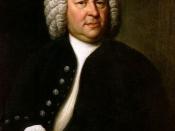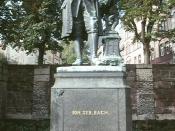As German family of musicians and composers, the Bachs achieved the height of their fame in the 17th and 18th centuries. Seven Bach generations achieved greater or lesser prominence in music from 1580 to about 1800. Of the group, Johann Sebastian Bach has been acclaimed as one of the giants of musical history.
Johann Sebastian Bach was born in Eisenach, Germany, on March 21, 1685. Or-phaned when he was ten, he was cared for by his eldest brother. In 1700 he became part of a select choir of poor boys at the school of the Michaelskirche, Luneburg. He held various musical posts, including that of organist at Arnstadt (1703-07), at Muhlhausen (1707-08), and at Weimar (1708-17). He was kapellmeister (music director) at Kothen from 1717 to 1723.
As an organist and choirmaster for Lutheran churches near his birthplace, Bach devoted his life to composing music for the church services. His incredible output marks the summit of the polyphonic, or contrapuntal, style.
Amazingly versatile and productive, he wrote magnificent music for the organ, for choral groups, for clavier and harpsichord, for orchestra, and for small groups of instru-ments. Bach was the master of the technique known as the fugue. In this, voices or in-strumental parts enter at different points, each imitating the first. After entering, however, each part is varied. The result is a very complex counterpoint.
Bach perfected the chorale-prelude, a contrapuntal composition based upon a cho-rale, or hymn tune, of the Lutheran church. Chorales were also used in Bach's cantatas--large works for a chorus of singers and accompanying instruments. Other compositions by Bach include a number of suites, whose various movements consist of dance rhythms of the 16th to 18th centuries--the allemande, courante, saraband, and gigue.
One of Bach's most famous works is `The Well-Tempered Clavier,' a collection of...



Well done
This essay was well written. I would of tryed to add more information on his famous pieces he composed, and the hardships he faced.
Other than that this essay is nice.
5 out of 5 people found this comment useful.